
The first trial in a case challenging the Trump administration’s policy of detaining and deporting international students and professors who participate in pro-Palestinian activism is underway in Boston. The American Association of University Professors and the Middle East Studies Association brought the lawsuit. Government lawyers tried to get it dismissed, but U.S. District Judge William Young, an 84-year-old Ronald Reagan nominee, ordered a trial, saying it was the “best way to get at truth.”
“Students and faculty all over the country are quite literally terrified about the possibility that their advocacy and expression will lead to detention,” says Jameel Jaffer, director of the Knight First Amendment Institute at Columbia University and one of the lawyers challenging the Trump administration. “They are terrified that ICE agents will show up at their door any day and take them away.”
Transcript
AMY GOODMAN: This is Democracy Now!, democracynow.org. I’m Amy Goodman.
We look now at the first case to go to trial that challenges the Trump administration’s policy of arresting, detaining and deporting international students and professors who participate in pro-Palestinian activism. The trial began this week, after the case was filed in March by the American Association of University Professors, the AAUP, including its chapters at Harvard, New York University and Rutgers, and the Middle East Studies Association, MESA. The Trump administration tried to get the case dismissed, but those efforts were rejected by U.S. District Judge William Young, an 84-year-old Ronald Reagan appointee, who ordered a trial, saying it was the, quote, “best way to get at the truth.”
In a minute, we’ll get an update on the first two days of the trial, where the first of some 20 witnesses testified. But first we go to Zachary Samalin, associate professor of English at NYU, vice president of the NYU AAUP chapter, speaking at a rally Monday outside the Boston courthouse.
ZACHARY SAMALIN: We joined the lawsuit because we refuse to let Trump, Rubio or anybody else use citizenship to divide and conquer us. And above all, we joined to fight back against the criminalization of all protests, but especially of protest against the destruction and ethnic cleansing of Palestine.
AMY GOODMAN: Another speaker at Monday’s rally was Caroline Light, a senior lecturer in gender and sexuality studies at Harvard University, a member of Harvard’s AAUP, another one of the plaintiffs in the case.
CAROLINE LIGHT: This lawsuit is deeply personal to me and to my mom. We are descended from people who fled pogroms in the Jewish Pale of Settlement to come to the United States seeking refuge, and especially so that they could practice their freedom of religion, that the old country denied us. Right?
A key tenet of Judaism that I was raised with is something called tikkun olam. It literally means repairing the world. It is the responsibility of every Jewish person to do their best to try to denounce oppression wherever we see it, to speak out against unfairness and harm and violence against others.
Last Hanukkah, my eldest child gifted me this keffiyeh that I’m wearing today. And it’s a little warm, honestly, but I wear it in solidarity with my brave friends and colleagues and students who have spoken out against the relentless violence in Gaza. It feels like such a small thing to do. And yet, in the context of this chilling of freedom of expression and criminalization of pro-Palestinian solidarity, this mere act of wearing a keffiyeh is often characterized as subversion and as antisemitism, just wearing it.
So, this administration claims that ideological deportations are necessary, are part of their effort to fight antisemitism and to keep Jewish people from harm. Well, I’ll tell you what harms Jewish people. And I can speak as a historian on this topic. It’s the relentless assault on freedom of expression. It’s the language of us versus them. And it’s the criminalization of our valued community members, our colleagues and our students.
Make no mistake: We all suffer when some of us are silenced. In a university setting especially, it makes honest inquiry absolutely impossible. We can’t do our jobs as educators, as researchers, when these circumstances prevail. And so, today, we are fighting back. And as I said, this is personal for me and for my mom. And to the spurious claim that ideological deportation protects Jewish people, I’ll say it today, and I’ll say it until I have no voice left: Not in my name.
AMY GOODMAN: That’s Caroline Light, senior lecturer in gender and sexuality studies at Harvard University, a member of Harvard AAUP, one of the plaintiffs in this case, the American Association of University Professors v. Rubio.
For more, we’re joined in Boston, before day three of the trial, by Jameel Jaffer, director of the Knight First Amendment Institute at Columbia University, part of the team of lawyers representing professors in their lawsuit against the Trump administration’s repression of students and faculty involved in pro-Palestine activism. He was previously the ACLU’s deputy legal director.
Jameel Jaffer, welcome back to Democracy Now! Explain why this case went to trial. We see so many injunctions issued by judges across the country, but this one is being heard by a federal judge, not before a jury, but before the judge.
JAMEEL JAFFER: Right, yeah. Well, we moved for preliminary relief in the case. So we, you know, filed a motion very soon after we filed the complaint, asking the court to grant immediate relief. And the court said that it wouldn’t grant immediate relief, but it would give us a trial on an expedited schedule. We are before a judge who has a practice of collapsing requests for preliminary relief with trials on the merit, so this is not entirely unprecedented or surprising. And it does give us an opportunity to create a complete factual record, and we are very grateful for that. And, you know, as you noted, the trial started yesterday — or, Monday. Today is day three. We expect it to go through the end of next
week.
AMY GOODMAN: So, why did the AAUP sue Rubio, Marco Rubio, the secretary of state, the case known —
JAMEEL JAFFER: Yeah.
AMY GOODMAN: — as AAUP v. Rubio?
JAMEEL JAFFER: Yeah, so, I know you’ve talked about the student cases many, many times. You know, there are a dozen students, at least, who have been arrested, detained and threatened with deportation on the basis of their pro-Palestinian advocacy. There are hundreds of others whose visas have been revoked under the same — under the same policy. Some of those students have filed suit. Some of them were held in detention, and judges have now released them from detention. Those cases are ongoing, because the Trump administration continues to assert the authority to deport people on the basis of their pro-Palestinian expression and association.
But our view and, more importantly, the American Association of University Professors’ view and the Middle East Studies Association’s view, was that these arrests and detentions and threatened deportations are causing harm not only to, most obviously, the students who are being detained and threatened with deportation, but to the larger academic community, as well, because students and faculty all over the country are quite literally terrified about the possibility that their advocacy and expression will lead to detention. They are terrified that ICE agents will show up at their door any day and take them away because they wrote an op-ed critical of Israel or because they attended a public protest. And the result is that there is this climate of fear and repression on college campuses across the country. And this case is an effort to get at that larger climate of fear and repression caused by this ideological deportation policy. I think it’s, you know, complementary to the cases that have been filed by the students themselves.
AMY GOODMAN: Can you talk about some of the witnesses, like the Brown anthropologist Nadje Al-Ali and Megan Hyska, who is a Northwestern University philosophy professor, how they’ve changed what they do? They’re no longer writing the pieces they’re supposed to be publishing, because of the climate in this country today —
JAMEEL JAFFER: Yeah.
AMY GOODMAN: — and the direct physical threats.
JAMEEL JAFFER: Yeah, I mean, this is — this is a more general pattern, but we have had three witnesses testify over the last two days. You mentioned two of them: Nadje Al-Ali at Brown University, Megan Hyska at Northwestern University. And yesterday we had Bernhard Nickel, who is — was, until very recently, the chair of the Philosophy Department at Harvard University. The three of them testified to the chill that has taken hold at university campuses across the country. And they describe their own decisions to forego certain kinds of expression or scholarship or public presentation because of the fear of arrest and detention and deportation. All three of them are foreign citizens. That has been the bulk of the testimony presented to the court over the last two days.
Today, for the first time, we will hear from a government official. We’re going to hear from Peter Hatch, who is a senior official in the Department of Homeland Security, who was intimately involved in the decisions to identify students to be targeted under this — under this policy.
AMY GOODMAN: Can you talk about the lawsuit being filed jointly with the Middle East Studies Association, programs of regional areas that are coming under attack by the Trump administration — in late March, Columbia announcing it will place its Middle Eastern, South Asian and African Studies Department under review to secure some $400 million in federal funding that had been frozen? It’s your university, Jameel, where you run the Knight Institute.
JAMEEL JAFFER: Yeah, yeah. I mean, you know, the chill that we’ve described in the case, I think, is felt across the country, across universities, across departments. Now, that said, I think it falls most heavily on professors and students at universities that have already been targeted in other ways by the Trump administration. Columbia is one of those. Harvard is another. You know, and even if you look at the students who have been arrested and detained under this policy, a number of them come from Columbia University — Mohsen Mahdawi, Yunseo Chung, Mahmoud Khalil. These are all Columbia students. And I think that it’s fair to say that students at those universities are especially terrified about the possibility that ICE will target them.
So, you know, the goal of this lawsuit is to get broad relief, not limited to any particular student, but rather relief with respect to the policy itself. And the policy, as we describe it, is the arrest and detention and deportation of students based on their pro-Palestinian advocacy and expression. And we point to the statements that senior government officials, including President Trump and Secretary Rubio, have made in press conferences, on social media, in threatening students and faculty with deportation for their First Amendment-protected activity. We point to cables that have been issued by the State Department implementing the president’s orders to target pro-Palestinian students. And we point also to the testimony of government witnesses. So far, we have depositions, but starting today, we’ll have testimony, as well, from government officials who were intimately involved in the decision to target particular students.
AMY GOODMAN: And we’ll continue to follow this case as it goes on for two weeks. But I also wanted to ask you, Jameel Jaffer, about the Knight First Amendment Institute, your organization, appearing to have won your appeal to have a lawsuit you filed on behalf of the Central American news outlet El Faro against the notorious spyware company NSO Group remanded to the court for reconsideration after it was thrown out for jurisdictional reasons. Can you explain? We interviewed one of the El Faro reporters, the whole group of them forced to leave El Salvador, afraid for their lives.
JAMEEL JAFFER: Yeah, yeah. I mean, I have to say that these reporters are so inspiring, these reporters who work with El Faro, a Salvadoran news organization that has been sort of crucial in reporting on democratic movements and the threat of authoritarianism, or the actuality of authoritarianism, in Central America. And, you know, they were targeted a couple years ago with spyware, probably or almost certainly operated by the Salvadoran government, but provided by NSO Group, the notorious spyware manufacturer. And we filed suit on their behalf in California. The case was dismissed by the district court on the grounds that the case didn’t belong in California. The plaintiffs were in El Salvador; the defendant was in Israel. But we argued that because the attacks themselves had relied on the subversion of Apple’s infrastructure in California, the case belonged in California. And we went to the appeals court to challenge the district court’s dismissal of the case. My colleague, Carrie DeCell, argued it before the appeals court a few months ago. And yesterday, as you know, the appeals court vacated the district court’s dismissal, reinstated the case, which is great news. It means that we will now be, we hope, able to litigate the merits in the district court in California.
AMY GOODMAN: Well, I want to thank you, Jameel Jaffer, for being with us, joining us from right near the Boston courthouse where the AAUP v. Rubio is being heard before a federal judge, director of the Knight First Amendment Institute at Columbia University. And for those who want to go to our website at democracynow.org, you can see our interview with the El Faro journalist Roman Gressier.
Next up, to Philadelphia, where the largest sanitation strike in a generation has just ended in the last few hours. Stay with us.
[break]
AMY GOODMAN: Zeshan B, performing his rendition of “Ain’t No Love in the Heart of the City” in our Democracy Now! studio.

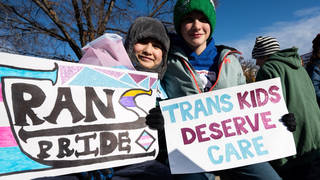
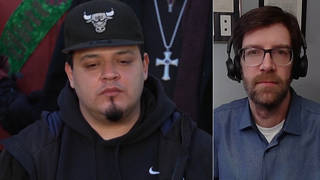
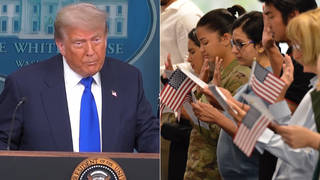
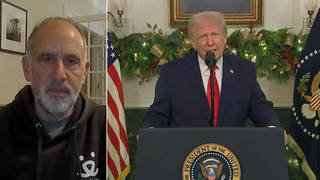





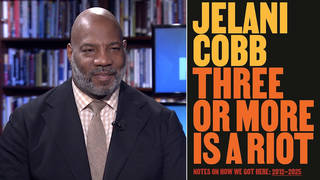

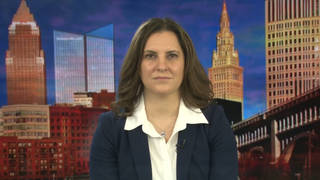
Media Options